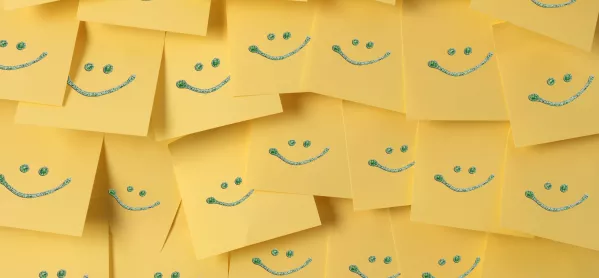Joy is essential in education, so let’s fight for it

“Where has the joy gone?”
The question hit me like a freight train and took some time to process.
I’d been talking to a colleague about the mood among teachers and students we knew, and the question seemed to summarise something quite profound.
Of course, one expects a bit of teenage gloom from GCSE and A-level students at this time of year. But the malaise seems wider than that.
Tough times for all
I recently asked a friend of my son if he was enjoying school and he looked at me as if I had asked if he had enjoyed buying a train ticket. “Enjoyment” wasn’t the dimension within which this activity existed.
The mood among staff has hardly been better. A YouGov survey this week revealed that around a quarter of teachers say they are likely to leave the profession in the next three years.
No one expects to be, for want of a better word, overjoyed in school every day, but there seems to be a drudgery about it all; a sense of grinding onwards and just trying to make it through in one piece.
Is this as good as it gets?
We are coming out - hopefully - of a traumatic pandemic and it’s important not to draw too drastic conclusions about anything when there has been so much upheaval.
But decreasing satisfaction with life is part of a longer trend for our country’s teenagers, with the UK having - according to an Organisation for Economic Cooperation and Development (OECD) study - the largest decrease of any nation globally between 2015 and 2018, and more than twice the OECD average, long before any pandemic.
What has moved in the opposite direction is our curriculum, which is - according to Andreas Schleicher, director of education and skills at the OECD - against the flow of most other countries towards a more traditional model that focuses on narrow academic results.
In the throes of teacher assessed grades, this feels uncomfortably true. There’s a sense that “everything is in play” - every homework, every answer to every question, every mini-test.
With one small mistake, like the chaotic butterfly’s wings, it can feel like a tornado has been triggered and the future that had been mapped out is decimated.
It’s this mood that’s led to a group of parents bringing a class action against the Department for Education over last summer’s grades fiasco which, they claim, has cost their children a better future.
The end of the meritocracy
But what if this highly competitive economy is itself failing? In the past, although there was pressure and hard work, at least one might expect certain outputs for given inputs.
Now, with exams cancelled-but-not-cancelled, along with the multiple forces of Covid, Brexit and climate change, doubts are now expressed about whether this still holds true.
What, I’ve heard students ponder is: “What if I work incredibly hard and succeed to the very best of my ability, and still that’s not even enough to give me access to secure employment, expectation of owning a home or enjoying a retirement?” Would it be any surprise to feel anxiety at all of this? Surely anxiety would be a natural response?
I’m reminded of EM Forster’s words in Howards End: “Those who prepare for all the emergencies of life may equip themselves at the expense of joy.”
What’s it all about anyway?
But do we want education to be an exercise in “winning the future”, a competitive battle for grades in order to unlock the door to financial security in an uncertain rat-race.
We know that there is no joy in seeing children put through this.
The joy is in seeing students challenged, in helping them to grow as young people, in discussing topics in class free from the sense that it is building to another assessment and helping them discover what it is they enjoy.
We might not bin examinations forever but we must fight hard for curriculum time decoupled from the grade machine, to show that it doesn’t hold all the cards.
If joy is currently at a low ebb, it is not because students and teachers are offended by hard work but because, deep down, we know that the course of our efforts isn’t quite set right.
A fight on our hands
To increase joy - and what higher human calling can there be? - will not mean doing less. It will likely mean fighting a tough political battle on behalf of young people to allow schools to model a society in which success is genuinely measured differently.
Uniting our professional mettle, we need to campaign to deliver what we know: that the meaning of an education isn’t a series of numbers or letters but a victory for the flourishing of human potential, a capability for life, a capacity for enthusiasm.
Achieve half of that and I’ll be happy - and a lot of children will be, too.
Kester Brewin has taught mathematics across a wide variety of schools for the past 20 years. He tweets as @kesterbrewin
You need a Tes subscription to read this article
Subscribe now to read this article and get other subscriber-only content:
- Unlimited access to all Tes magazine content
- Exclusive subscriber-only stories
- Award-winning email newsletters
Already a subscriber? Log in
You need a subscription to read this article
Subscribe now to read this article and get other subscriber-only content, including:
- Unlimited access to all Tes magazine content
- Exclusive subscriber-only stories
- Award-winning email newsletters